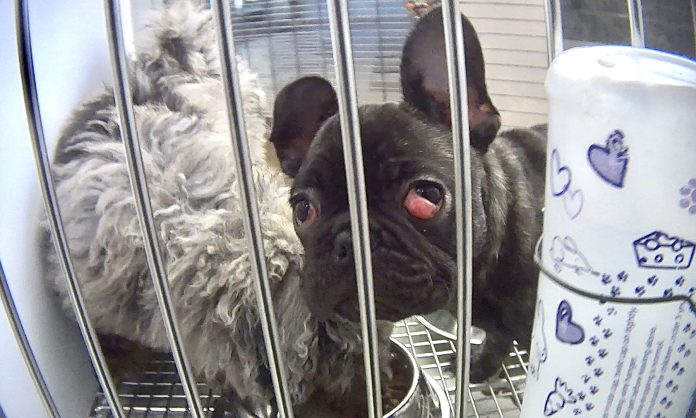An undercover investigator with Humane Society of the United States (HSUS) who worked as a kennel attendant at a Petland store in Novi, Michigan, documented sick puppies, dangerous conditions, and improper animal care.
The investigator witnessed puppies being delivered in unmarked vans from out of state, transported in stacked crates in the dark. Puppies with bloody feces were made available to the public for purchase.
Transportation documents revealed that the Petland store has sourced puppies from problematic puppy mills, at least five of which have been included in the HSUS Horrible Hundred report due to state and federal inspection records documenting egregious or repeated animal care violations. Researchers obtained transportation paperwork linking at least 11 additional Michigan stores to known puppy mills.
Some puppies suffered from wounds, congenital defects, hacking coughs, eye and nasal discharge, or vomiting and diarrhea. Others were lethargic, shivering or refused to eat. Some puppies had bloody feces but were still available for purchase, despite store staff being aware of these concerning issues.
A Petland manager indicated that Freeman Raber in Ohio was one of their steadiest puppy suppliers, and had been sending the store puppies for about a decade. Raber was in the HSUS 2023 Horrible Hundred report after a state inspector cited him for improperly doing his own surgical procedures on several litters of puppies; the state report described the violation as “egregious.”
Several puppies arrived at the store with obvious abdominal wounds. The consulting veterinarian described some of the wounds as repaired hernias, but in some cases, the incisions were opening back up and seemed infected. Some of the other puppies had issues such as abnormal masses, soft spots on their skulls, and other signs of congenital defects.
-
On several occasions, puppies fell out of their stacked cages and hit the hard floor. Conversations with Petland employees indicated this was a recurring problem and had led to broken bones.
-
The HSUS investigator recorded as puppies were unloaded from stacked metal cages in dark, crowded distributor vans with out-of-state tags. One of the workers used a flashlight to pick out the dogs who were going to Petland; the other dogs would be delivered to additional pet stores on the route. One of the van workers complained openly about having to go back to Illinois to pick up “more of these f**king yipping dogs.”



